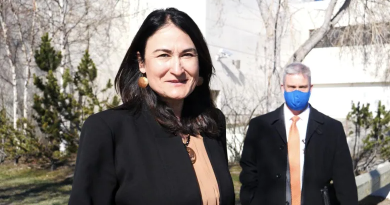Biden’s fentanyl position draws support from Alaska’s chief medical officer

President Joe Biden’s calls in his State of the Union speech for strong criminal penalties in response to soaring deaths linked to the potent opioid fentanyl are being rebuked by harm reduction advocates who say that approach could make the problem worse, even as some in Congress jeered the comments and blamed the Democrat’s border policies for deepening the crisis.
The proposal has support among some health officials, however, including Alaska’s chief medical officer. Dr. Anne Zink, who also serves as president of the Association of State and Territorial Health Officials, said in a statement that she welcomes his efforts to prevent overdoses, make access to treatment equitable and disrupt fentanyl trafficking.
The reactions during Biden’s address laid bare how preventing drug deaths touches on deep political, practical and philosophical differences even in addressing an unrelenting U.S. overdose crisis connected to more than 100,000 deaths a year.
After introducing a New Hampshire father whose 20-year-old daughter died eight years ago from a fentanyl overdose, Biden laid out a grim statistic: “Fentanyl is killing more than 70,000 Americans a year.”
A few lawmakers called out “It’s the border.” The voice of one, Rep. Andy Ogles, a Tennessee Republican, rang out clearly: “It’s your fault!”
Biden paused, smirked and went on, laying out his his approach for dealing with the crisis, including calling for inspecting more packages and cargo coming into the country.
One phrase in particular — “strong penalties to crack down on fentanyl trafficking” — drew applause in the House chamber but criticism from harm reduction advocates working to contain the crisis.
While such advocates support other aspects of Biden’s framework, their view is that handling the crisis largely as a law enforcement issue makes it worse, and that “strong penalties” could be linked to permanently listing fentanyl-related drugs in the highest tier of controlled substances. That brings higher penalties and make it harder for researchers to work with them. All fentanyl-related drugs are listed on that tier through 2024, but it’s up to Congress to decide whether to make it permanent.
“When you criminalize things, you create stigma around substances,” said Maritza Perez Medina, director of federal affairs at the Drug Policy Alliance. “If people know they’re going to get in trouble for using substances, they’re going to be reluctant to call for help.”
More dangerous substances
Harry Cullen, an organizer with the harm reduction advocacy group P.A.I.N., said efforts to control the fentanyl supply have led the emergence of other, even more dangerous substances in the drug supply, such as Xylazine, which is used as a veterinarian sedative, and nitazenes, another class of opioids.
“To double down on criminalization is not the way forward,” Cullen said.
Harm reduction advocates call for increasing availability of medication-assisted treatment and measures to prevent fatal overdoses through measures such as providing supplies to test drugs for fentanyl, and naloxone, a drug that reverses opioid overdoses.
Asked about disappointment from some public health advocates that Biden didn’t roll out new treatment initiatives, White House press secretary Karine Jean-Pierre said Wednesday that Washington “has more work to do.”
The administration has advanced some efforts more than previous governments, such as allowing more federal money to be used for naloxone and making it easier to prescribe anti-addiction medications.
Among some Republicans, though, the overdose crisis is seen foremost as a border and law-enforcement issue.
Fentanyl and related synthetic opioids are potent and can be transported in small amounts. When they first began having a major impact in the U.S. about a decade ago, they were largely being produced in labs in China and shipped into the country.
Over time that has changed. Experts say most of the supply is now made in Mexico from chemicals imported from China. The drug is pressed into fake prescription pills and added to other illegal drugs. Officials say it is being brought to the U.S. mostly through legal ports of entry, eluding detection.
Some who overdose on fentanyl don’t know they’re using it. But in other cases, drug users seek it out specifically.
On Wednesday, 21 Republican state attorneys general wrote a letter to Biden and Secretary of State Andrew Blinken calling on them to designate Mexican drug cartels as foreign terrorist organizations.
“The same cartels who produce and traffic this dangerous chemical are also assassinating rivals and government officials, ambushing, and killing Americans at the border, and engaging in an armed insurgency against the Mexican government,” the letter said. “This dangerous terrorist activity occurring at our border will not abate unless we escalate our response.”
Last year a group of Republican AGs requested the president declare fentanyl a weapon of mass destruction. No action has been taken.
Regina LaBelle, who served as acting director of the National Drug Control Policy earlier in Biden’s presidency, said the U.S. needs to deal with groups bringing fentanyl into the country. “These are transnational criminal organizations that traffic in people, fuel and drugs,” she said.
But she warned: “If you focus only on that part of the issue, you’re not doing your job.”
Related stories from around the North:
Canada: Mayo residents say Yukon gov’t efforts to address substance use fall short, CBC News
United States: Craft space aims to teach Alaska Indigenous women skills — and help beat addiction, Alaska Public Media



